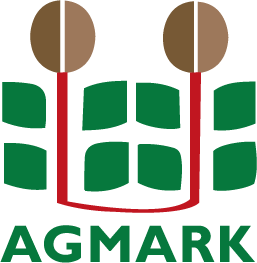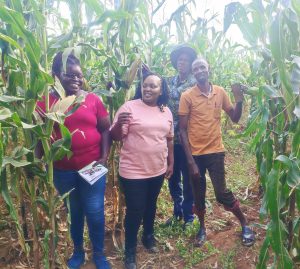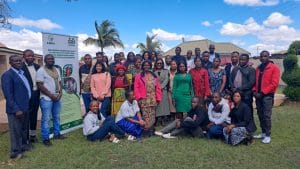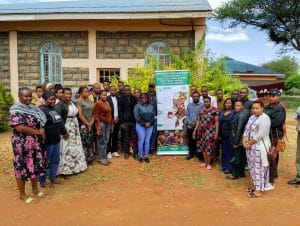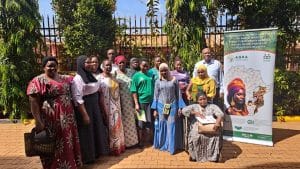A new wave of Gen Z-led trade is on the rise across East Africa, and AGMARK is proud to be nurturing the next generation of cross-border business leaders.
AGMARK, in partnership with AGRA, continues to champion inclusive and structured grain trade across East and Southern Africa through the Cross Border Trade Association (CBTA) empowerment project.
As part of this project, AGMARK, recently conducted a high-impact Youth and Women Cross-Border Trade Training in Busia, Kenya, with a strong focus on grain standards, post-harvest management, and business advisory, alongside access to structured markets and sustainable trade platforms.The 3-day program, held between June 17 and 19, 2025, brought together Gen Z traders, farmers, and aspiring entrepreneurs—70% of them women—who are determined to scale their agribusiness ventures beyond borders. The program was designed to enhance participants’ readiness for modern agribusiness while promoting green jobs and sustainable economic development.
As part of this project, AGMARK, recently conducted a high-impact Youth and Women Cross-Border Trade Training in Busia, Kenya, with a strong focus on grain standards, post-harvest management, and business advisory, alongside access to structured markets and sustainable trade platforms.The 3-day program, held between June 17 and 19, 2025, brought together Gen Z traders, farmers, and aspiring entrepreneurs—70% of them women—who are determined to scale their agribusiness ventures beyond borders. The program was designed to enhance participants’ readiness for modern agribusiness while promoting green jobs and sustainable economic development.
Gen Z Business Skills Training
The initiative kicked off with stakeholder mobilization and logistical planning. Local leaders, farmer groups, and cross-border traders were engaged to ensure inclusive participation. Over three packed days, Gen Z participants explored hands-on, practical modules covering the entire grain trade value chain:
- Grain Standards & Quality Parameters in the ESA Region: Understanding what sells in structured markets.
- Post-Harvest Management: Keeping product quality high and losses low.
- Negotiation & Contracting: How to close deals with processors, cooperatives, and traders.
- Market Intelligence: Leveraging platforms like the COMESA Regional Food Balance Sheet.
- Trade Linkages & Dispute Resolution: Navigating contracts, resolving conflicts, and understanding the Simplified Trade Regime (STR).
One standout session was led by Mr. Elly Mutai of the Kenya Revenue Authority (KRA), who simplified trade policy into real-life business tools for youth. He broke down the complexities of the Simplified Trade Regime (STR) for Micro, Small and Medium Enterprises (MSMEs), helping participants understand how to legally and efficiently move goods across borders. What is often seen as dry policy was broken down into practical knowledge—empowering young traders to navigate customs procedures, access duty-free thresholds, and avoid common pitfalls in informal trade. Many participants described the session as an “eye-opener” and a “game-changer” for their businesses.
Challenges Faced and Resilience Shown
Despite a few logistical hurdles, the enthusiasm and commitment of the youth participants remained unwavering.The training venue, Rasto Park Hotel, saw an overwhelming turnout, resulting in overcrowded rooms that tested both space and comfort, particularly young parents and participants with physical limitations.
A number of young mothers attended the sessions with their infants, balancing parenting duties while remaining fully engaged in discussions and activities. While occasional disruptions occurred, these moments also highlighted the determination of Gen Z to show up and grow, regardless of personal circumstances.
A number of young mothers attended the sessions with their infants, balancing parenting duties while remaining fully engaged in discussions and activities. While occasional disruptions occurred, these moments also highlighted the determination of Gen Z to show up and grow, regardless of personal circumstances.
There were also heightened expectations around the scope of the project, particularly regarding immediate economic benefits. Through open dialogue and transparent communication, facilitators helped participants better understand the program’s long-term objectives, emphasizing knowledge-building, market access, and sustainable impact over quick financial outcomes.
These real-life moments were a powerful reminder that youth are not just eager to lead—they are already leading. But for their potential to flourish, training programs must be inclusive by design, with attention to infrastructure, accessibility, and life realities. With the right support systems in place, the next generation of cross-border traders can rise even higher.
These real-life moments were a powerful reminder that youth are not just eager to lead—they are already leading. But for their potential to flourish, training programs must be inclusive by design, with attention to infrastructure, accessibility, and life realities. With the right support systems in place, the next generation of cross-border traders can rise even higher.
The Bigger Picture
With 100% youth attendance and 70% women participants, the energy and determination in the room were palpable. These sessions don’t just transfer skills—they spark movements, build networks, and create a pipeline of leaders for tomorrow’s trade landscape.
This training is part of a regional initiative targeting border points like Busia, Namanga, Tunduma-Nakonde, and Kasumulu-Songwe, aiming to build a pipeline of youth-led agribusinesses in East and Southern Africa, and expanding support for women and youth in structured grain trade. AGMARK aims to involve more women and youth in future CBTA trainings by implementing targeted outreach, flexible scheduling, supportive environments, and mentorship programs, while also providing financial incentives and recognizing their achievements.
This training is part of a regional initiative targeting border points like Busia, Namanga, Tunduma-Nakonde, and Kasumulu-Songwe, aiming to build a pipeline of youth-led agribusinesses in East and Southern Africa, and expanding support for women and youth in structured grain trade. AGMARK aims to involve more women and youth in future CBTA trainings by implementing targeted outreach, flexible scheduling, supportive environments, and mentorship programs, while also providing financial incentives and recognizing their achievements.
By training Gen Z in business advisory, market standards, and trade policy, AGMARK and AGRA are enabling youth to not just participate, but lead in structured grain trade and green jobs.The future of trade isn’t coming—it’s already here. And it’s Gen Z.
